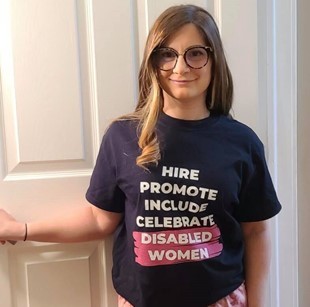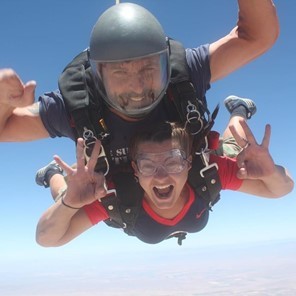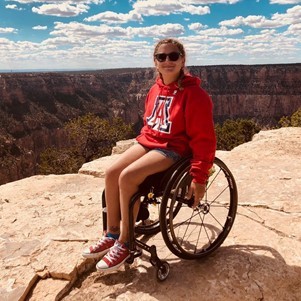“I want to see more representation of disabled women in higher education. I want to get to the point where there are so many of us you can’t name all of us on one hand.”
Dr. Toni Saia talks higher education, disability culture, and empowering disabled women to be leaders.

“I do not like to do the same thing every day, I try to be involved in different projects to keep life interesting and engage a new audience,” Dr. Toni Saia said with a smile, and she was not kidding. Dr. Saia is an Assistant Professor and the Director of the Rehabilitation Technology Certificate at San Diego State University (SDSU), where she teaches graduate students within the Rehabilitation Counseling Program. She is also the Project Leader for Foundations of Inclusion and Accessibility at the Museum, Arts and Culture Access Consortium, which is a grant project to increase access for people with disabilities at cultural institutions in New York City and beyond. If that wasn’t enough, Dr. Saia also serves on several professional boards, including the Society for Disability Studies and the Rehabilitation Counselors and Educators Association. She does all of this while also finding time to travel the country with her boyfriend in search of the most exhilarating theme parks. “I can’t resist thrilling roller coasters, my hair whipping around me while screaming for joy,” Dr. Saia added with a laugh.
Dr. Saia has an intense energy level that might only be matched by her intense love for the Disability Community, and perhaps her love for movie theater popcorn (“I never miss an opportunity to have it, even if I am uninterested in the movie choice,” she confessed). Though Dr. Saia is just beginning her career at SDSU, she’s been advocating for Disability Rights for more than a decade.
 As a member of the grassroots Disability Rights group, ADAPT, Dr. Saia has participated in protests to advocate for the rights of people with disabilities nationwide for years. “My favorite part of protesting with ADAPT was when we all came together from around the world to fight for our rights as a community regardless of if it impacted us individually,” shared Dr. Saia “Even as we were fighting for our rights, I remember feeling liberated because it was one of the first times in my life, I could unapologetically be myself surrounded by my people. Proud to be disabled. Fighting together as one.”
As a member of the grassroots Disability Rights group, ADAPT, Dr. Saia has participated in protests to advocate for the rights of people with disabilities nationwide for years. “My favorite part of protesting with ADAPT was when we all came together from around the world to fight for our rights as a community regardless of if it impacted us individually,” shared Dr. Saia “Even as we were fighting for our rights, I remember feeling liberated because it was one of the first times in my life, I could unapologetically be myself surrounded by my people. Proud to be disabled. Fighting together as one.”
Dr. Saia has also advocated for the Disability Community in higher education. In fact, as a first-generation college student, Dr. Saia credits higher ed in helping her find her disability identity. After leaving her first college due to lack of accessibility, Dr. Saia attended the University of Arizona, where she helped to establish the Disability Cultural Center on campus and was hired as the first program coordinator.

Now that she’s moved on to teach at SDSU, Dr. Saia is still spreading the disability culture love. “I am eager to give disabled students the opportunity to explore their disability identity and culture in my classes but across campus as well,” Dr. Saia expressed with enthusiasm. “I want to see more representation of disabled women in higher education. I want to get to the point where there are so many of us you can’t name all of us on one hand.”
Dr. Saia isn’t just talking about this goal – she’s actively working on it. At SDSU, she teaches courses such as rehabilitation foundations, policy and governance, assistive technology, and fieldwork courses. “It is vital to have a disabled woman in this role because representation matters,” explained Dr. Saia. “I can authentically bridge the gap between what the textbook says and the lived experience of disability.”


 As a member of the grassroots Disability Rights group, ADAPT, Dr. Saia has participated in protests to advocate for the rights of people with disabilities nationwide for years. “My favorite part of protesting with ADAPT was when we all came together from around the world to fight for our rights as a community regardless of if it impacted us individually,” shared Dr. Saia “Even as we were fighting for our rights, I remember feeling liberated because it was one of the first times in my life, I could unapologetically be myself surrounded by my people. Proud to be disabled. Fighting together as one.”
As a member of the grassroots Disability Rights group, ADAPT, Dr. Saia has participated in protests to advocate for the rights of people with disabilities nationwide for years. “My favorite part of protesting with ADAPT was when we all came together from around the world to fight for our rights as a community regardless of if it impacted us individually,” shared Dr. Saia “Even as we were fighting for our rights, I remember feeling liberated because it was one of the first times in my life, I could unapologetically be myself surrounded by my people. Proud to be disabled. Fighting together as one.”